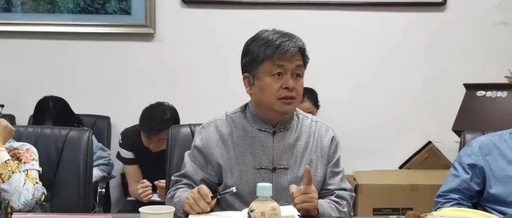Click Heart Medicine Xiao Langzhong↑ Accompanying You to Grow TogetherAuthor|Jia Dailin (WeChat ID: tcmjdl) Source|Heart Medicine Xiao Langzhong (WeChat Official Account)

【Abstract】
This article is an excerpt from the sharing session of Teacher Jia Haizhong during the “Kengqiang TCM Exchange” recording on April 13, 2022. The content mainly includes Teacher Jia’s insights on the relationship between teeth and internal injury diseases.

Image from previous on-site exchange
Recording of Teacher Jia Haizhong’s experience sharing
【Cardiac Origin Toothache】
What are the characteristics of cardiac origin toothache? I see that everyone is quite concerned about this.
Cardiac origin toothache is indeed easily overlooked. Many do not realize its relationship with heart disease. Just now, Dr. Zhang and Dr. Zhao raised this issue and provided explanations. I would like to add a point, as I have been working in cardiovascular diseases for a long time and have some insights. What are the characteristics of toothache caused by myocardial ischemia?
The first characteristic is that when a patient says they have a toothache, and upon examination, the teeth are fine, you should be cautious. The characteristics of the pain are not related to biting. The pain does not worsen with biting, which is a key feature.
The second characteristic is that if it is not a myocardial infarction, as Dr. Zhao Yong mentioned, the toothache can last for a relatively long time. However, typical myocardial ischemia or atypical angina manifests as pain in the teeth and neck. The most significant characteristic of this pain is its duration. Toothache caused by angina generally lasts for a few minutes and then alleviates, after which there is no pain in the teeth. This should raise high alert for myocardial ischemia. Therefore, in clinical practice, recognizing this characteristic often prevents toothache from being misdiagnosed and delaying heart disease treatment. I just wanted to add this point.
【Teeth and Oral Environment】
Next, I will discuss some insights regarding teeth and internal injury diseases. I believe it is more important to talk about teeth because they are closely related to the five internal organs. However, I want to emphasize two aspects.
One aspect is the impact of the environment on teeth. Our teeth are in the oral cavity, surrounded by saliva, and are exposed to food daily. Please note that saliva is the protector of teeth; if saliva is insufficient, teeth cannot be healthy. You see that children who drool often have healthy teeth. If the saliva has a taste or is reduced, their teeth will not be healthy. As Dr. Zhao mentioned, adenoid hypertrophy can lead to reduced saliva due to nasal obstruction from mouth breathing, resulting in tooth decay. Such cases are quite common. Therefore, I emphasize the health of saliva. How does the health of saliva relate to our internal organs?
One is oral hygiene. If you maintain regular brushing or gargling with salt water, the oral cavity is less likely to be invaded by external pathogens, preventing harm to the gums and teeth. Therefore, when treating dental diseases, we must look for causes in the environment, saliva, and periodontal health. Maintaining oral cleanliness is paramount.
【How to Maintain Normal Saliva in the Oral Cavity】
So how can we maintain normal saliva in the oral cavity? This involves three important internal organs.
The first is the lungs. We rarely connect dental diseases with the lungs. However, in clinical practice, when you see a lot of this type of disease, you will notice that some patients, especially children with nasal obstruction or adenoid hypertrophy, often breathe through their mouths. Additionally, those with sleep apnea wake up with dry mouths and need to keep a glass of water by their bedside. Generally, these patients have poor dental health because dry mouths cannot eliminate external bacteria, leading to proliferation and damage to our enamel and gums. Therefore, treating dental diseases from the lung perspective means ensuring the nasal passages and respiratory tract are clear, allowing the oral cavity to retain sufficient saliva. This way, the teeth are less likely to decay.
The second is related to the spleen. In TCM, both the spleen and kidneys are involved. The spleen is responsible for saliva, while the kidneys are responsible for the secretion of saliva, which relates to the five internal organs and five fluids. What is the difference between saliva and secretion? Sometimes our understanding is unclear. In fact, saliva refers to the moisture in the mouth, while secretion refers to the sticky part of saliva. Western medicine considers clear fluid as water, so the kidneys govern water, hence they govern saliva. The spleen governs secretion, which aids digestion because the first stage of digestion occurs in the mouth under the action of saliva. Therefore, TCM states that the spleen governs secretion, which includes components that promote digestion and protect the mouth by eliminating bacteria, all of which fall under the category of secretion.
In clinical practice, if we see dry mouth, it indicates that the kidney’s function of governing water is impaired, leading to a lack of moisture. It is like not watering a plant; the top becomes dry. After spleen deficiency, digestive function declines, absorption capacity decreases, and naturally, saliva secretion reduces, resulting in poor oral resistance. Therefore, deficiency of the spleen and kidneys is an internal cause of dental and oral diseases.
【Teeth and Gums】
From the external environment perspective, we look at saliva and gums. Gum disease is often due to infection, and many cases are due to excessive heat. This is caused by external pathogens. In clinical practice, cold, heat, dampness, and dryness can all be involved.
If cold pathogens cause gum and tooth disease, it often leads to pain. The color of the gums is often pale, not red. The most effective herbs for this type of pain are Hua Jiao (Sichuan Pepper), Xi Xin (Asarum), and Fu Zi (Aconite). These herbs can be boiled and used as a mouthwash to quickly relieve pain. Especially during toothaches, if you are in a hurry, just holding a Sichuan pepper in your mouth can provide rapid relief.
If heat pathogens are the cause, you can use Huang Qin (Scutellaria), Huang Lian (Coptis), and Zhi Zi (Gardenia), which are all herbs that clear heat. Additionally, Bo He (Mint), which has anesthetic and pain-relieving properties, can also be used. Furthermore, there is something commonly found at home; if you are in a hurry or do not have medicine, Kombu (Kelp) is very effective for treating gum swelling and pain. Generally, boiling two ounces of kelp in water and drinking it can provide relief within hours. If you drink it the night before, you may find significant improvement by the next day. Therefore, it is a very good remedy that is both food and medicine.
If wind pathogens are involved, without obvious cold or heat characteristics, we generally consider it to be caused by wind pathogens. In this case, using insect-based herbs like Jiang Can (Silkworm), Quan Xie (Scorpion), and Wu Gong (Centipede) can be very effective for dispelling wind and relieving pain.
If there is significant swelling and dampness is evident, using Ting Li Zi (Descurainia), and Shi Chang Pu (Acorus) can effectively dispel dampness, reduce swelling, and promote blood circulation.
If dryness is the cause, we can generally use Ge Gen (Pueraria), and Tian Hua Fen (Trichosanthes). Of course, you can adjust the herbs based on the diagnosis.
Earlier, I heard Dr. Zhao mention purple or dark gums. In clinical practice, there are indeed some patients with naturally dark gums, indicating a stasis blood constitution. Such individuals not only have poor dental health but also tend to have a higher risk of hypertension and aortic dissection. We have encountered such cases, and it is only through long-term observation that we recognize this internal pattern. Therefore, resolving stasis blood is crucial. As Dr. Zhao mentioned, using San Qi Powder (Notoginseng Powder) is excellent. In clinical practice, I generally choose Dan Shen (Salvia), Chuan Xiong (Ligusticum), and Dang Gui (Angelica). Why do I choose these? Because Chuan Xiong, Dang Gui, and Dan Shen are particularly effective in improving microcirculation, especially in cases of heat pathogens causing widespread stasis. Using these herbs in larger doses has proven to be quite effective.
【Protection of Teeth】
Additionally, I believe there are many ancient methods for protecting our teeth. For example, during practice, one should press the tongue against the palate or move the tongue around in the mouth. This promotes saliva secretion, which is beneficial for teeth. Generally, during practice, it is required to press the tongue against the palate, which often leads to continuous saliva production. This has an immediate effect, and everyone should have experienced this during practice.
Moreover, dietary habits are also important. Since we are discussing oral diseases and their causes, there are several common causes in modern life, such as excessive consumption of acidic substances. For instance, vinegar, apple cider vinegar, and other acidic substances can easily lead to the loosening of tooth enamel. This can result in dentin sensitivity and even enamel loss. When this occurs, if dentin sensitivity arises, chewing a few walnuts can provide rapid relief, but it is best to eliminate the cause. Walnuts are very effective for this type of toothache. Additionally, carbonated drinks also harm teeth. You can notice that after drinking, your teeth feel rough, indicating that the enamel has been damaged by the beverage. Therefore, it is not advisable to consume too much, or after drinking, one should quickly drink water or eat something else. In summary, do not let it linger in your mouth.
Furthermore, I have a personal experience where I found that honey is bad for teeth. After consuming honey, I often feel my teeth becoming loose. I do not know if other doctors have noticed this or if anyone else has experienced it. My experience is quite pronounced. Therefore, in my household, I tend to avoid honey. If someone gives it to me, I do not consume it much. I find that as long as I eat honey, within a day or two, my teeth feel loose. If I do not eat it, everything is fine. I do not know if this is a general issue or not, but I ask everyone to observe in clinical practice if there is any regularity. If so, we can suggest that especially those with poor dental health should not consume too much honey. Those with good teeth may not have a problem, but for those with poor teeth, it can lead to looseness. Acidic beverages and carbonated drinks can also lead to roughness in the teeth.
【Treatment】
I think that is all I want to share. Tonifying the spleen and kidneys with Liuwu Di Huang Wan (Six Flavor Rehmannia Pill) is quite good. Using this as a base for adjustments should be quite effective. Alright, I will stop here.
“Kengqiang TCM Academic Salon” Introduction:
Supported by Beijing University of Chinese Medicine and Dongzhimen Hospital, the “Kengqiang TCM Academic Salon” was jointly initiated by Professor Zhao Jinxie and Professor Jia Haizhong as a purely public welfare TCM academic salon. The term “Kengqiang” signifies a strong and resonant voice for TCM, with an academic debate connotation, and symbolizes the rapid development of TCM. The “Kengqiang TCM Salon” is held monthly, discussing important, hot, and misunderstood academic topics in TCM. Through exchanges and discussions among experts, some popular but incorrect viewpoints in TCM are clarified, and in-depth discussions on various issues in TCM education, research, and clinical practice are conducted. To ensure the salon is closely linked with clinical efficacy, most invited experts are TCM practitioners working on the front lines. The original intention of the “Kengqiang TCM Salon” is to cultivate excellent TCM clinical talents, with each discussion naturally revolving around the central theme of “improving TCM clinical efficacy.” After each “Kengqiang TCM Salon” event, Zhao Jinxie arranges for graduate students to transcribe the recordings into written documents. The magazine “Global Traditional Chinese Medicine” has a special column to publish these discussion manuscripts. At the end of 2017, the “Kengqiang TCM Salon” column in “Global Traditional Chinese Medicine” was selected as an excellent promotional work by the National Health and Family Planning Commission.

